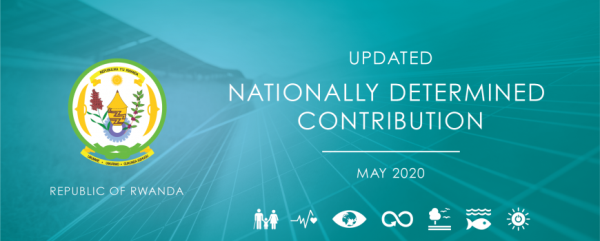
Kigali: Government of Rwanda has announced an ambitious climate action agenda that features a 38% reduction of greenhouse gas emissions compared to business as usual by 2030, equivalent to an estimated mitigation of up to 4.6 million tonnes of carbon dioxide equivalent (tCO2e).
The climate action plan, known officially as the Nationally Determined Contributions (NDCs), has been submitted to the United Nations Framework Convention on Climate Change and forms part of Rwanda’s obligations under the Paris Agreement. All countries are required to submit an updated plan every five years, each with a greater level of ambition. Rwanda is the first country in Africa to submit its updated NDC, and the ninth country globally.
The updated NDC climate action plan has been informed by in-depth analysis, improved information and data, increased ambition, and an extensive stakeholder driven consultation process. It will see Rwanda invest billions of dollars in the transition to an inclusive, sustainable economy driven forward by green growth and green job creation.
Rwanda’s total emissions are currently forecast to more than double over the 2015-2030 period. Reducing these emissions by 38% will come through improvements in energy production and use, industrial processes and product use, waste management, transport, and agriculture as well as new nature-based conservation initiatives. To support the country to be more resilient to climate extremes, adaptation initiatives will focus on water, agriculture, land and forestry, human settlement, health, transport and mining.
Taken together, the country’s efforts to limit its contribution to climate change and adapt to the consequences over the next decade will require approximately US $11 billion, made up of 5.7 billion dollars for mitigation and 5.3 billion dollars for adaptation. It is expected that this funding will come from both domestic and external sources.
“Rwanda is pleased to submit its updated Nationally Determined Contribution under the Paris Agreement. Our country is already counting the cost of climate change. We have tragically lost more than 150 citizens with more than 4,000 homes damaged due to floods and landslides this year alone*. With this new, more ambitious climate action plan, we have a clear roadmap to limit our already low emissions and ensure our community and economy are resilient to the impacts of a warming world,” said Jeanne d’Arc Mujawamariya, Minister of Environment.
“Congratulations Rwanda for submitting an updated Nationally Determined Contribution to the United Nations Framework Convention on Climate Change. I am glad to see your commitment in paving the way towards a sustainable future, strengthened through the adoption of a quantitative business as usual (BAU) target and increased sectoral coverage of the Nationally Determined Contribution,” said Patricia Espinosa, Executive Secretary, UN Climate Change.
The development of Rwanda’s updated Nationally Determined Contribution was supported by the World Bank and the NDC Partnership.
The Paris Agreement on Climate Change requests each country to outline and communicate their post-2020 climate actions, known as their Nationally Determined Contributions (NDCs). Together, these climate actions determine whether the world will achieve the long-term goals of the Paris Agreement. NDCs embody efforts by each country to reduce national emissions and adapt to the impacts of climate change.
The Paris Agreement is a comprehensive framework for action on climate change, guiding the steps all nations will take to reduce their contribution to global warming. The Agreement also includes the provision for US $100 billion per year of climate finance and technology transfer to support developing nations to deal with the impacts of climate change and make the transition to a green economy.(End)
